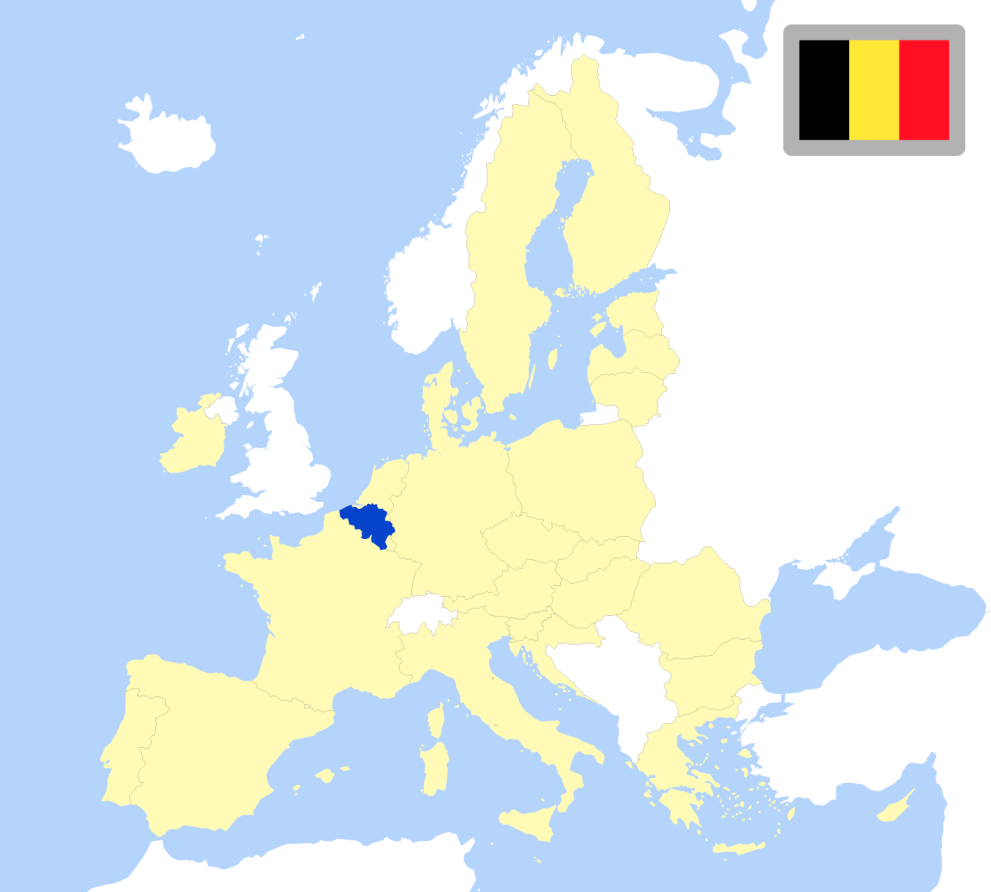Overview
Capital: Brussels
Official EU language(s): Dutch, French, German
EU Member State: since 1 January 1958
Currency: euro (€)
Euro area: member since 1 January 1999
Schengen: member since 26 March 1995
Figures:
- Geographical size: 30 667 km2
- Population: 11 900 123
(Source: Eurostat - 2025 figures for geographical size and population)

Political system
Belgium is a federal constitutional monarchy in which the king is the head of state and the prime minister is the head of government in a multi-party system. Decision-making powers are divided between 3 levels of government: the federal government, 3 language-based communities (Flemish, French and German-speaking) and 3 regions (Flanders, Brussels Capital and Wallonia). Legally they all are equal, but they have powers and responsibilities for different fields.
Brussels is, together with Luxembourg City and Strasbourg, one of the three official seats of the European institutions.
Trade and economy
Belgium ranks sixth in the European Union in terms of GDP per capita with €44 800, well above the EU average (€38 100). It accounts for 3.5% of the EU's total GDP.
(Source: Eurostat - 2023 figures for GDP per capita and GDP)
(Source: Eurostat - 2024 figures for exports and imports)
There are 22 representatives from Belgium in the European Parliament. Find out who these Members of the European Parliament are and follow the activities of the European Parliament’s office in Belgium.
In the Council of the EU, national ministers meet regularly to adopt EU laws and coordinate policies. Representatives from the Belgian government attend Council meetings focused on their area of responsibility several times a year.
The Council of the EU does not have a permanent, single-person president (like the Commission or Parliament). Instead, its work is led by the country holding the Council presidency, which rotates every 6 months.
During these 6 months, ministers from that country's government chair and help determine the agenda of Council meetings in the different policy areas, and facilitate dialogue with the other EU institutions.
Dates of Belgian presidencies:
Jan-Jun 1958 | Jan-Jun 1961 | Jan-Jun 1964 | Jan-Jun 1967 | Jan-Jun 1970 | Jan-Jun 1973 | Jul-Dec 1977 | Jan-Jun 1982 | Jan-Jun 1987 | Jul-Dec 1993 | Jul-Dec 2001 | Jul-Dec 2010 | Jan-Jun 2024
The European Commissioner nominated by Belgium is Hadja Lahbib who is responsible for equality, preparedness and crisis management.
The Commission is represented in each EU country by a local office, called a "representation". Find out more about the Commission's representation in Belgium.
Belgium has 12 representatives on the European Economic and Social Committee. This advisory body – representing employers, workers and other interest groups – is consulted on proposed laws, to get a better idea of the possible changes to work and social situations in different countries.
Belgium has 12 representatives on the European Committee of the Regions, the EU's assembly of regional and local representatives. This advisory body is consulted on proposed laws, to ensure these laws take account of the perspective from each region of the EU.
Belgium also communicates with the EU institutions through its permanent representation in Brussels. As Belgium's "embassy to the EU", its main task is to ensure that the country's interests and policies are heard and pursued as much as possible in the EU.
Budgets and funding
How does Belgium benefit from the EU budget?
The EU budget is the tool to ensure that Europe remains a democratic, peaceful, prosperous and competitive force. The EU uses it to finance its priorities and big projects that most individual EU countries could not finance on their own.
The benefits of EU membership significantly exceed the size of the EU budget contributions and the examples are many. All Member States benefit from being part of the Single Market, a shared approach to the common challenges of migration, terrorism and climate change, and concrete gains like better transport infrastructure, modernised and digitalised public services and cutting-edge medical treatment.
How much each EU country pays into the EU budget is calculated fairly. The larger your country's economy, the more it pays – and vice versa.
The EU budget is not about giving and taking – it’s about collectively contributing to making Europe and the world a better place for us all.
EU budget spending and revenue per country and per year
EU-funded projects in Belgium
Money from the EU budget helps fund programmes and projects in all EU countries – for example to build roads, subsidise researchers and protect the environment.
Find out more about how Belgium benefits from EU funding and recovery funds in your country or region.
